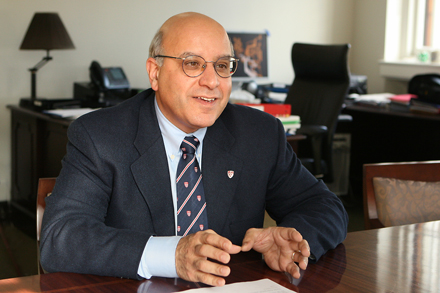To get an update on the McGill’s financial situation, The Reporter asked Provost Anthony C. Masi to answer four questions on the response to McGill’s plan to cut $43.5 million from its operating budget.
Two months ago, the University confirmed being on-track to reach the required $43.5 million in savings without having to resort to collective dismissals. Can you comment on this?
The cuts in the government operating grant combined with the rescinding of announced tuition increases meant that over a little more than a year, McGill will have lost $56 million in revenues. Consequently, we had to implement a significant cost-reduction plan, involving many difficult decisions.
We tried to spread the cost-reduction effort as equally as possible among units and staff while preserving our core research and teaching missions. Many staff had to give up their salary increases, senior administrators took pay cuts, and many open positions will go unfilled.
More people than we predicted took advantage of the voluntary retirement program. While paying out these retirement packages will actually create a larger than anticipated deficit for FY2014, that will be a temporary expense.
The big achievement was that we avoided collective dismissals, furloughs, or general pay cuts. Some individual positions will be abolished in units that need to reduce their budget, but this can be done strategically to take into account the unit’s changing needs. Not everyone is happy with the decisions made, but most people understood the trade-off we face: If we increase salaries we have to reduce the number of people who work at McGill. Once again, the McGill community has stepped up, pitched in, and is working hard to get the job done.
However, we still have some hard work yet to reduce expenditures and, where possible, augment revenues between now and April 30, 2014, but we are on the right track.
All groups must deliver on the cost-reduction plans that were accepted in lieu of recourse to collective dismissals. If we do not meet the targets, then we will have to reconsider our approach. I am optimistic that we can, and will, achieve our goals and objectives if we stay the course.
I would also caution against becoming complacent. Quebec’s fragile economic situation persists, and McGill depends heavily on the public purse. Our operating budget remains under severe pressure, so we are asking everyone to reflect on how to make our operations more efficient and productive, and for staff to work within their teams to act quickly on these ideas. Where possible, we have to find innovative ways of generating new revenues that are consistent with our values and objectives as a research-intensive world-class university.
We also face the challenge of the significant loss of institutional memory and reductions in our workforce – both inevitable outcomes of the voluntary retirement plan, the abolition of positions, and the tighter controls on hiring across our campuses. We ask managers to work closely with Human Resources to minimize the effects and, as we seek creative solutions, to continue to provide high levels of service.
I am very heartened by the efforts being made in all sectors of our University. At the same time, the effects of the retirement program, position abolitions, and hiring controls will not have an even impact, so we have to analyze each department’s plan carefully and ensure that it is implemented properly. So far, we are moving in the right direction and more or less at the right speed; we just have to keep plowing along and not get distracted.
The courage and determination of members of the McGill community have allowed this great institution to prevail in the past and I believe this will happen again. With each passing day, my confidence grows that I will be able to present a balanced budget to the Board of Governors for Fiscal Year 2015, including sufficient surpluses to repay the first installment on the over $40-million increase in our accumulated operating deficit. But a balanced budget must also reflect our core academic and research missions as outlined in our strategic plan (ASAP).
I am looking forward to working with our new Principal, Prof. Suzanne Fortier, to secure better, more stable and predictable funding for the future. Along the way, however, we must get used to a culture of financial diligence, doing more and better with less! Together we can turn this crisis into an opportunity to question, to innovate, and to implement pragmatic and adaptable solutions.
It won’t be easy, but we have the right stuff in our McGill people to be successful.
